May 15: E-Stories
RUattacksUA CombatSit Kharkiv BehindLines InRussia Allies Georgia China A&P UKDef ISW Avdeeva Farrell Budanov Forbes Franke Higgins Kuleba Scholz Blinken Lautman Sumlenny Kodalashvili CivilGE Brady
Catching up…
EA Worldview’s Ukraine Up-date- hop over to Scott’s amazing hourly Ukraine up-date page. I’ll fill in with some bits and bobs.
The stories this week to focus on: the Russian advance toward Kharkiv and the protests in Georgia.
Stories we’re following…
Russian attacks against Ukraine kill 3, injure 18 over past day. Russia targeted a total of 10 Ukrainian oblasts — Sumy, Mykolaiv, Luhansk, Odesa, Donetsk, Zaporizhzhia, Dnipropetrovsk, Chernihiv, Kharkiv, and Kherson. Casualties were reported in the latter four regions.
Over 7,500 civilians evacuated from northern Kharkiv Oblast. Of the 7,531 people who have been evacuated so far, 568 are children, and 201 are people with disabilities, Syniehubov said.
Russia attacks 106 infrastructure facilities in Ukraine in one day. Various weapons were used in the attacks and 107 settlements were targeted. Thousands of households in seven oblasts are suffering power outages due to Russian attacks, the Energy Ministry reported.
Russian air strikes on Kharkiv injure 21 people, including 3 children. Russian forces attacked Kharkiv with the UMPB D-30 type of bombs, according to the Kharkiv Oblast Prosecutor's Office.
Construction of fortifications around Vovchansk was 'difficult,' official says. The construction of fortifications around the border town of Vovchansk in Kharkiv Oblast was "difficult" due to constant Russian shelling, Tamaz Gambarashvili, the head of Vovchansk City Military Administration, told Radio Svoboda on May 13.
Maria Avdeeva’s report from Kharkiv: My analysis of the situation in and around Kharkiv: Russian attack didn't catch the city by surprise. Kharkiv knows how to live with monsters just 40 km away.
Police: Russian cluster munitions attack in Chernihiv Oblast injures 3. Russian troops attacked the border town of Snovsk in Chernihiv Oblast on May 13 with cluster munitions, injuring three people, Ukraine's National Police reported.
Ukraine introduces emergency power cuts throughout country amid 'significant' shortage. Ukraine's state-owned energy operator Ukrenergo said it had to introduce additional restrictions due to the damage from the recent Russian strikes against Ukrainian energy infrastructure and the increase in electricity consumption after the temperature drop.
Ukraine receives emergency energy supply from Europe amid power shortages. Ukraine received an emergency electricity supply from Poland, Romania, and Slovakia amid an ongoing power shortage following Russia's attacks on energy infrastructure, the Energy Ministry reported on May 11.
WSJ: Ukrainian air interception rates decline amidst heightened Russian attacks. Ukraine's ability to intercept Russian missile attacks has declined, according to a report by the Wall Street Journal on May 13.
This is Francis Farrell coming to you from Kharkiv, where Ukraine’s second-largest city continues to stand proud despite being the target of this unnerving new offensive by Russian forces.
I want to stress that although only a few villages have been captured and Russia might not make it much further in this sector, this is a pivotal point in the war. To put it as simply as possible, American weapons and shells are on their way, but no amount of foreign aid can solve Ukraine’s manpower and fortifications problems.
Knowing this, Russia has decided to move now, pressuring the Ukrainian military on as many fronts as possible and hoping it will break somewhere. How Ukraine can handle this attack on Kharkiv, the primary aim of which is likely to draw forces away from Donetsk Oblast, could say a lot about how the war develops further.
Combat Situation Update
Due to the critical situation in Ukraine at this moment, President Zelensky canceled his planned visit to Portugal and Spain this week.
Heavy fighting in Vovchansk on May 14. The Russians are trying to gain a foothold in the city.
General Staff: Russian forces 'partially succeed' near Lukiantsi in Kharkiv Oblast. Russian forces have "partially succeeded" near the village of Lukiantsi in Kharkiv Oblast as its offensive in the region continues, Ukraine's General Staff reported on May 13.
Budanov sees stabilization signs in Kharkiv Oblast hostilities. Ukraine's military intelligence chief Kyrylo Budanov's statement came after he reportedly told the New York Times a day before that the situation in the region "was on the edge" and "moved toward critical every hour."
Budanov expects Russia to launch new attack on Sumy Oblast. Ukraine's military intelligence chief Kyrylo Budanov expects that after Ukrainian forces stabilize the front in Kharkiv Oblast, Russia will launch a new attack in Sumy Oblast, the New York Times (NYT) reported on May 14.
George Barros for ISW: Current US policy prohibiting Ukraine from using US-provided weapons in the territory of Russia is severely compromising Ukraine's ability to defend itself against the renewed cross-border invasion Russia has recently launched in Kharkiv Oblast.
US policy has effectively created a vast sanctuary in which Russia has been able to amass its ground invasion force and from which it is launching glide bombs and other long-range strike systems in support of its renewed invasion.
Whatever the merits of this US policy before the Russian assault on Kharkiv Oblast began, it should be modified immediately to reflect the urgent realities of the current situation.
Important: Roderich Kiesewetter from the CDU pledges that with cross-border air defense, Western countries could shoot down Russian missiles over Ukraine. This would relieve the burden on Ukrainian air defense and allow it to protect the front. (Me: this is now being discussed seriously. It would entail states at Ukraine’s border to serve as a protective shield. The armaments would not be inside Ukraine but close enough to Ukraine’s borders to shoot down missiles.)
ISW Assessment: The US should allow Ukraine to strike legitimate military targets in Russia’s rear with US-provided weapons. Russia’s sanctuary shields hundreds of legitimate military targets in rear areas that Ukrainian forces are capable of striking.
Removing Russia’s sanctuary will degrade Russian logistics by forcing Russia to reconfigure rear support areas and logistics nodes to protect them from Ukrainian strikes.
Reevaluating Russia’s sanctuary is not an all-or-nothing affair. Standing US prohibitions on how Ukrainian forces may use US-provided weapons will not prevent Western weapons from striking Russia. Ukraine has long struck legitimate targets in Russia w/ any weapons it can and will continue to do so.
The US need not greenlight the use of all US-provided military systems against any target in the Russian Federation and still lift its restrictions enough to allow Ukrainian forces to defend themselves against immediate operational assaults.
In an attempt to create logistic difficulties for Ukraine, Russians have destroyed the Staryi Saltiv Dam in the Kharkiv region.
May 11: The US Department of State has approved the urgent sale of 3 HIMARS multiple-launch rocket systems to Ukraine. The estimated total cost is $30 million, which will be funded by the Government of Germany on behalf of Ukraine.
Overnight, Ukrainian UAVs attacked an oil refinery in the Volgograd region. A fire started there. Also in the Lipetsk region, an industrial area was targeted. On the night of May 12, three significant objects within Russia were targeted during drone attacks by the GUR. The Volgograd Oil Refinery, the Kaluganefteprodukt oil depot in Lyudinove, and the Novolypetsk metallurgical plant were the targets.
On May 14, in Novocheboksarsk, Chuvashia region in Russia, a big fire broke out at the Khimprom plant. This chemical industry plant is among the biggest in Russia, producing over 200 products.
Military: Ukraine downs Russian Ka-52 attack helicopter. Ukrainian forces shot down a Russian Ka-52 Alligator attack helicopter on May 13, the 47th Mechanized Brigade reported. Later in the day, Ukraine's 110th Separate Mechanized Brigade shot down a Russian Su-25 fighter jet.
An air defence base in the Ai-Petri, a peak in the Crimean Mountains (temporarily occupied Crimea), has been damaged by a missile attack, killing the commander of the military unit, Crimean Wind (Krymskyi Viter) and Astra report.
Noel Report: On the territory of occupied Crimea near Belbek air base, a series of explosions took place. Sounds similar to the detonation of ammunition are also heard. According to Russian media, at least 20 explosions were reported.. The Russian MoD claims it shot down 10 ATACMS.
Russian authorities are recruiting citizens from at least 21 countries to fight against Ukraine, reports Forbes. The two main groups who are being targeted are students and migrants, who are tempted by offers with high salaries for security guard jobs in Russia, but immediately upon arrival they are forced to sign a contract with the Russian forces. (Video: Nepalese recruits in the video receive instructions.)
They quickly undergo a short military training course and are sent to fight against Ukraine. It is extremely difficult to prove if they are mercenaries, but numerous episodes of mercenary recruitment constitute a violation of the Convention regulating their recruitment.
Behind the Lines
FT: Moldova, EU to sign security pact. Moldova and the EU intend to sign a security agreement in the next week, increasing cooperation in the spheres of defense, cyber threats, and foreign interference to "unprecedented levels," the Financial Times reported on May 14.
Freight train derailed in Russia's Volgograd Oblast due to alleged 'interference.' Several cars of a freight train in Russia's Volgograd Oblast were derailed due to "interference by unauthorized persons," the Russian state-owned news agency TASS reported on May 14, citing a statement from the Russian railway services.
North Korean propaganda video: North Korean leader Kim Jong Un inspects a large number of new “tactical missile weapon system”. Hwasong-11D ballistic missiles visible. The range of the Hwasong-11D missile is estimated to be about 100-180 kilometers, each launcher is designed to launch 4 SRBMs.
Me: there is no way to verify this video. When was it filmed, are they real weapons? If real, have they been delivered? But these questions really don’t matter.
The intent of the video is to push North Korean propaganda as a reliable supplier to Russia’s war effort, and instill fear in the West. It’s also meant to demoralise the West: North Korea is able to manufacture and deliver weapons to Russia, while the West has not delivered weapons to Ukraine. It’s something to keep in mind as you’re scrolling social media and wondering about the intent of the content.
As Xi toured Europe last week to discuss Ukraine and trade, China remains Russia's leading source of sanctioned dual-use goods, fueling the ongoing war.
"Around 90% of the goods deemed high priority products by the Western countries... (was) supplied by China" as Chinese-made products or re-exported goods in 2023, a sharp rise from 30% in 2021, Nathaniel Sher, a senior research analyst at Carnegie China, told the Kyiv Independent.
China-based companies pour a range of items – from drones to microchips and machine parts – into Russia, including products made in China and those that bypass Western export controls via Chinese entities.
Elliot Higgins-Bellingcat: Yet another fake BBC-Bellingcat video is doing the rounds, yet again shared by the sheyhtamir1974 Telegram channel. That's at least 7 since November 2023.
Me: there are several themes that emerge in the fake video. The main theme is that there is a rift between Zelensky and his Western partners. It paints a picture of disarray and division within the NATO-Ukraine relationship, which the Russians have been pushing since 2016.
It claims that Zelensky is a failure, and has not made good on his promises of resolving the recruitment problem in Ukraine. Secretly, the French will send forces once this issue has been resolved.
It’s extremely confusing but what is important is the timing: Ukraine is fighting on the Kharkiv front, and it must be allowed to strike Russian positions inside Russian territory if it has a chance of pushing back the attacks and missile strikes. This has caused consternation amongst Ukrainians and foreign military analysts who cannot understand why the US or other nations are self-deterring, and allowing Ukrainians to lose precious lives.
Meanwhile in Russia
Russian minister of defense Shoigu has been dismissed from his position. Putin has appointed Andrei Belousov as Minister of Defense. Besides Belousov, there was a general shuffle, and Nikolai Patrushev is being replaced by Shoigu as the president of the National Security Council to be replaced by Shoigu. Patrushev is now an ‘assistant’ to Putin overseeing ‘shipbuilding’, which Olga has said is akin to being a cleaner at the Kremlin.
I will disappoint you by saying that I don’t agree with most of the analysis has been released over the past 2 days. The idea that Belousov is an honest economist is something that doesn’t exist in Russia, and is only something we understand in the West. Belousov has been embroiled in a significant number of scandals concerning nepotism and shady deals. The analysis that comes closest to something worth reading comes from Meduza.
Looks like Belousov is really proud about the bells and whistles of his new job.
The current narrative being pushed amongst readers in the West: “Designated Russian defense minister vows to further integrate economy, military. Integrating the military with Russia's economy is a key task for its Defense Ministry, soon-to-be-appointed Russian Defense Minister Andrei Belousov told the Federation Council, Russia's upper house of parliament, on May 14.”
Me: Really? The Russian war effort has been almost completely upheld by imports of Western dual-use materials via various states, companies that continue operating in Russia that provide CMS services and other industrial products, and imports of lethal weapons from Iran, North Korea, and China. Putin is off to see Xi on Thursday, cap in hand, to ask for more help. (see story below)
Will one man change the way Russia operates? No. Russia’s problems are long-standing and tied to the nature of the state, and, more importantly, leadership which treats every industry as something to steal from and not build. How can Russia modernise if it is stuck in the middle ages?
Russian media: Russian Defense Ministry personnel chief Kuznetsov detained. Lieutenant General Yuri Kuznetsov, the head of the main personnel directorate of the Russian Defense Ministry, was detained on May 13 on criminal charges, the state-owned news agency TASS reported, citing undisclosed law enforcement sources.
Russia approves bill to ban 'undesirable' foreign state-funded organizations. Around 500 people remain in the city of Vovchansk, close to the Russian border. Earlier in the day, two casualties were reported in Vovchansk and the nearby village Liptsy.
Russia to increase taxes on struggling energy giant Gazprom this year. Gazprom’s revenue fell by 30% last year with a net loss of $6.9 billion, the largest in 25 years. Russia’s full-scale invasion of Ukraine led to worsening relations with Europe, limiting the operations of the company.
Expert: Putin may visit Vietnam, North Korea during trip to China.
"Putin might use this opportunity to visit Russia's three closest partners in Asia: China, Vietnam, and North Korea," Ian Storey, a fellow at Singapore's ISEAS-Yusof Ishak Institute, told Voice of America.
Care of Hanna Liubakova: This is Mali. Children were put on Soviet caps and St. George ribbons. While standing under Soviet banners, they sang Soviet songs at the Russian diplomatic school. The video capturing this was shared by the Russian Embassy in Mali and Niger.
Me: it feels like we are re-living the 1970s when the Soviets penetrated, satellised and colonised states in the Sahel and other parts of the African continent. This is what Russia’s political and psychological warfare looks like.
Political warfare is conducted by civilian organisations, while psychological warfare is conducted by the military against other militaries and/or civilians. Russia combines the two.
I’ll write a longer post about what we can possibly do to counter Russia’s political warfare. There are many approaches and campaigns that could be undertaken. These would depend on the target of our efforts, and the results we want to achieve as well as how they fit into our larger strategic aims.
Allied Support
Estonian official says Tallinn ‘seriously’ discussing sending troops to Ukraine for non-combat roles. The comments came after the head of Estonia's Armed Forces, General Martin Herem, said earlier in May that there had been talks about the possibility of sending Estonian soldiers to western Ukraine.
David Cameron: Situation in Kharkiv 'extremely dangerous'. Cameron stressed that Kyiv’s allies must do everything they can to “help the Ukrainians.” He pointed to the U.K.’s recent £3 billion ($3.74 billion) yearly package to Ukraine, adding that Westminster is “encouraging others to do the same.” Cameron added that the UK will never force Ukraine to sign a peace treaty.
Kuleba says narrative that 'Ukraine rejected peace deal' is 'lie promoted by Russia.' Foreign Minister Dmytro Kuleba said that Russia is intent on pushing this unsubstantiated narrative because it wants to "shift the blame for the war...to Ukraine."
EU Council approves Ukraine Plan needed for $54 billion support program. The approval of the plan will allow the European Commission to disburse up to 1.89 billion euros ($2 billion) in an additional pre-financing tranche until the start of regular payments tied to the implementation of the reforms.
Ambassador: Germany to supply Ukraine with another IRIS-T air defense system in May. Berlin will provide Kyiv with another IRIS-T air defense system in May, German Ambassador to Ukraine Martin Jager said on May 13.
Me: one day I would love to hear, “We’ll support Ukraine until victory.”
Me: the themes that Sergej had to rebut in his debate with a Varwick in Hamburg reflect a lot of thinking still in the West. There is a significant lobby that is waiting out the war to continue commercial relations with Russia. Basically, a neo-realist view. Neo-realists are aligned with Russian thinking in that they have no moral compass in relations with other states. Stronger, more powerful states can gobble up smaller states, and they will. Neo-realists say that ‘this is reality and we should accept it.’
I don’t prescribe to this way of thinking. If I did, I would have to accept that Ukrainians live under Russian occupation and the horror which that entails, and that international law is no longer useful in regulating international relations. It also means that I support an invasion of Italy: screw the concept of sovereign territory or government by consent of the people.
The EU wants to make extensive security commitments to Ukraine in its defense against Russia by the beginning of July at the latest. They relate to political, military and economic aid and are to remain in place until Ukraine has joined the EU and NATO.
Blinken arrives in Ukraine. U.S. Secretary of State Antony Blinken, who arrived in Ukraine by train early in the morning on May 14, hopes to "send a strong signal of reassurance to the Ukrainians who are obviously in a very difficult moment."
Blinken emphasizes long-term US security commitment to Ukraine in visit to Kyiv. "If Russia or anyone else were to attack Ukraine, we will work with Ukraine immediately at the highest levels to coordinate how to help you beat back the threat," U.S. Secretary of State Antony Blinken said.
Zelensky to Blinken: Ukraine needs 2 Patriots to protect Kharkiv Oblast. Ukraine's head of state said that Ukrainian defenders went through a "tough period" in the east of the country, stressing that Kyiv hopes to see the U.S. assistance arriving as soon as possible, Ukrinform reported.
Pål Jonson, Sweden's Defense Minister, clarified that Sweden does not currently have plans to deploy personnel to Ukraine. However, he indicated a willingness to consider such action, only if proposed by NATO allies.
Prohibiting Imports of Uranium Products from the Russian Federation. This bipartisan legislative action prohibits the import of Russian uranium products into the United States as of August 12, 2024, while enabling a waiver process with the Department of Energy, in consultation with the Departments of State and Commerce, through January 1, 2028, consistent with the law.
This prohibition supports the United States’ ongoing effort to reduce and ultimately eliminate our dependence on Russian uranium for civil nuclear power reactors by prohibiting uranium product imports from the Russian Federation.
Georgian government passes the the foreign agents’ bill
President Salome Zourabichvili has repeatedly vowed to veto the draft law if approved by parliament. She has two weeks from the date of submission to her office to do so. If rejected, parliament can finally override her veto and adopt the law with a simple majority, and it would then enter into force 15 days later. During the parliamentary debate on the third reading, a fist fight broke out in the chamber.
President Salomé Zourabichvili, who has backed the protestors, stressed the demonstrations have remained peaceful and said there would be no attempt to overthrow the government despite the strength of feeling on the streets. “The way and the place where we can reverse all of this is the elections in October,” Zourabichvili told CNN. “That’s the European way.”
We’ll never forget this woman, standing with the European flag fending off the water cannons of the riot police, held and protected by her fellow Georgians. They have been fighting the foreign agents’ bill for over a year. The government had backed down but it has passed. Each and every one of these Georgian citizens can be arrested once it has been signed by the government.
OC: Magazine Indigo has stated that one of their journalist’ GoPro cameras was confiscated by police while he was covering the protests. Speaking to Netgazeti, Saba Sordia said that despite identifying himself as a journalist, the police did not return his camera. Interference with a journalist’s professional activities is a criminal offence in Georgia.
Nini Kodalashvili: The camera crew of the Kremlin's propaganda, military TV channel Zvezda covered yesterday's Russian law protest from Rustaveli, while Russian oppositionists and Russian opposition media are not allowed in Georgia.
A Georgian woman made this perfectly clear by chasing the military propagandist and her camera crew away. This is how you do it.
OC: The opposition Strategy Aghamashenebeli party has spoken in favour of an opposition coalition, stating they ‘support any initiative on unity, without preconditions and reservations’, local media reports. ‘Strategy Agmashenebeli has always supported and still supports the idea of unity’, the party said. Strategy Aghmashenebeli was referring to the creation of a ‘European platform of national resistance’, as announced by Lelo leader Mamuka Khazaradz earlier today. The party is currently in coalition with the United National Movement (UNM).
Condemnation, but little action, so far. Georgia has been warned by the US government not to become an adversary of the west by falling back in line with Moscow, as its parliament defied mass street protests to pass a “Kremlin-inspired” law. The US assistant secretary of state Jim O’Brien spoke of his fears that the passing by Georgia’s parliament of a “foreign agents” bill on Tuesday could be yet another “turning point” in the former Soviet state’s troubled history. In comments that appeared to signal a conviction in Washington that the Georgian government was once again aligning with Russia, O’Brien suggested US funding could soon be pulled.
We are still waiting for the EU’s official position. As Politico reports, “EU countries and leaders reacted individually — Germany’s Annalena Baerbock, for one, posted on X that the law is “counter to Europe’s values” — but Brussels stayed mum.”
The US and Taiwan navies conducted joint drills in the Pacific in April that, officially, did not take place, four people briefed on the matter said, as the two militaries boost cooperation amid rising Chinese military threats. Gerry Doyle joins the Reuters World News podcast to share insights on the joint exercises.
China poses a genuine and increasing cyber risk to the United Kingdom, the head of British spy agency GCHQ said, adding that while Russia and Iran represented an immediate threat, Beijing was an epoch-defining challenge.
US President Joe Biden unveiled a bundle of steep tariff increases on an array of Chinese imports including electric vehicles, computer chips and medical products, risking an election-year standoff with Beijing. Listen to Trevor Hunnicutt explain why this matters in an election year.
“Two Chinese bidders have pulled out of a tender to supply a solar park in Romania, the latest sign that the EU’s new anti-subsidy powers are having a deterrent effect on companies Brussels claims receive financial support from Beijing.”
Now that Hungary and Serbia have signed onto so many contracts with the Chinese, I thought this would be a great read. Prof Brady is the world’s authority on Chinese political warfare.
The collapse of Vanuatu’s national airline is being linked to the Pacific Island’s indebtedness to Chinese Belt and Road Initiative infrastructure projects, with pressure on the Albanese government to bail it out.
Air Vanuatu slipped into voluntary liquidation on Friday after suddenly cancelling dozens of its international flights, with airlines across the Pacific rushing to help rescue stranded passengers. The Australian government is not planning any repatriation flights, although has asked Virgin Australia to increase its services to the island nation.
EY Australia was appointed liquidator on Friday after Air Vanuatu had been financially tottering for months, with sources saying the business had been starved of cash by its owner, Vanuatu’s government.
AFR Weekend has been told politicians have been cutting costs across the government as they scrambled to meet loan repayments to China for infrastructure under President Xi Jinping’s signature Belt and Road Initiative, a vehicle for building Chinese influence in developing countries.
According to the Lowy Institute’s Pacific Aid Map, China has been the second-biggest benefactor of finance to Vanuatu after Australia, providing $483 million in aid and loans. The biggest loan was for a $90 million port project, the construction of the South Pacific’s biggest wharf at Luganville to accommodate cruise ships.
Critics have accused China of “debt trap diplomacy”, saddling impoverished nations with loans they ultimately cannot afford to repay.
On the prospect of a bailout for Air Vanuatu, one source said: “The only question here is who comes in? Is it Australia or is it China? And who comes in first because the longer this drags on, the worst it is for Air Vanuatu and the islands.”
A Russian influence campaign seems to be attempting to sow division in the US around the college campus protests.
As protests at universities across the country—and the responses to them by college authorities and law enforcement—continue to stoke division and anger, the Kremlin appears to have taken a page from its foreign influence playbook, using its disinformation infrastructure in collaboration with state-run media and Telegram influencers in an effort to further divide American society.
Over the past week, a disinformation campaign operated by the Kremlin-aligned network Doppelganger amassed over 130,000 views on X, according to data shared exclusively with WIRED by Antibot4Navalny, a collective of anonymous Russian researchers who have spent years tracking the Russian influence operation.
Doppelganger is well known for using a network of inauthentic bot accounts to spread links to fake versions of real news websites. In the past, the network has impersonated websites as diverse as Le Monde in France and Fox News in the US. In recent months, the Doppelganger network has been used to stoke tensions in the US over the border crisis in Texas and boost false claims that celebrities like Taylor Swift were supporting Russia’s invasion of Ukraine.
The researchers were able to identify the bots as part of the Doppelganger network because of the URLs they were sharing, which have in the past been identified by Meta as those repeatedly used by the network.
Simultaneously, the network also promoted a link to a fake version of an Israeli website called The Liberal, which also portrayed Soros as the financier of the protests.
The covert Doppelganger campaign echoed narratives pushed by overt Russian channels, including Telegram groups and state-run media, which have spent the past week highlighting the “threat of deadly police violence against demonstrators” and linking the current protests to the Kent State protests in 1970 when four students were shot and killed by the National Guard. While there have been over 2,000 arrests at campus protests in the US so far, protests have largely been peaceful, and no one has been killed.
On Facebook, Sputnik wrote: “‘Land of the Free? How US Lawmakers Restrict Students’ Right to Peaceful Protest: US lawmakers have once again demonstrated where their sympathies lie in the Israeli-Palestinian conflict by cracking down on student protests against the bloodbath in the Gaza Strip.”
“As the 2024 US election nears, this is another example of signals emerging from Russian-language channels indicating Russia is turning its access to domestic US issues after nearly two years of focusing largely on Ukraine,” Kyle Walter, global head of investigative research and innovation at Logically, tells WIRED.
Russia is not alone in this. Together with China and Iran, state media in the three countries have produced nearly 400 articles in English about the campus protests in the space of two weeks, according to NewsGuard, an organization that tracks misinformation online. These governments have also used social media platforms in an official capacity to boost their narratives. A post on X from Nasser Kanaani, a spokesman for Iran’s Ministry of Foreign Affairs, depicted a student protester with the caption “Imprisonment of #freedom in the U.S.A.”




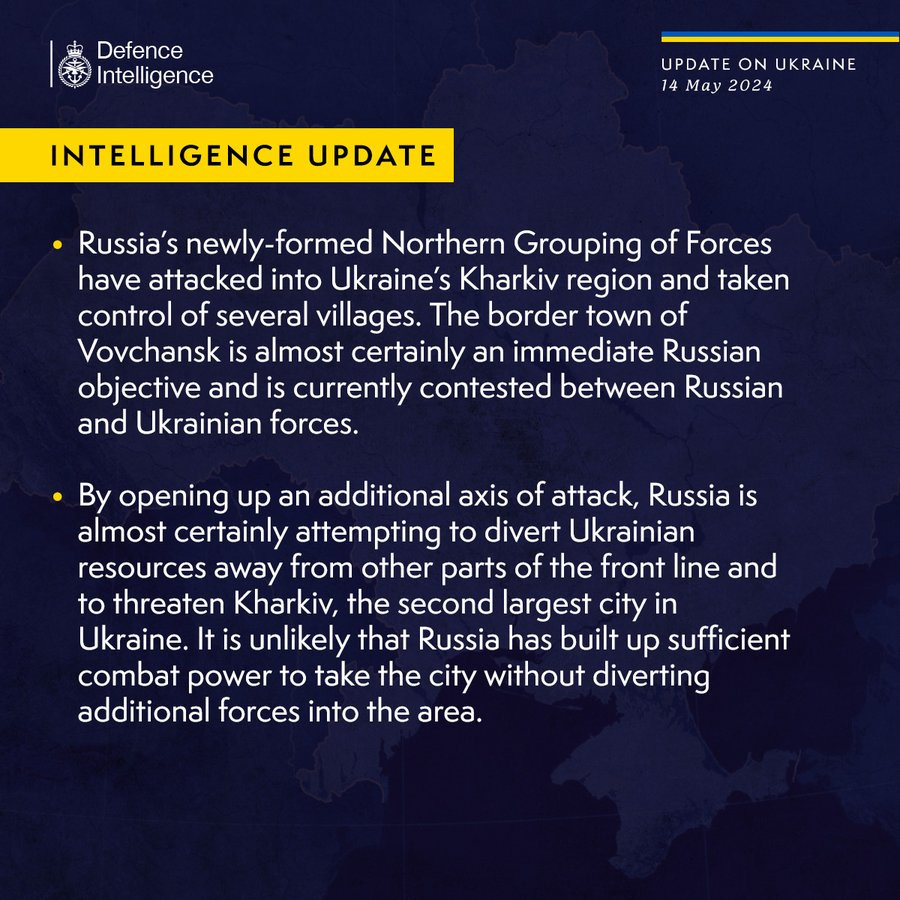
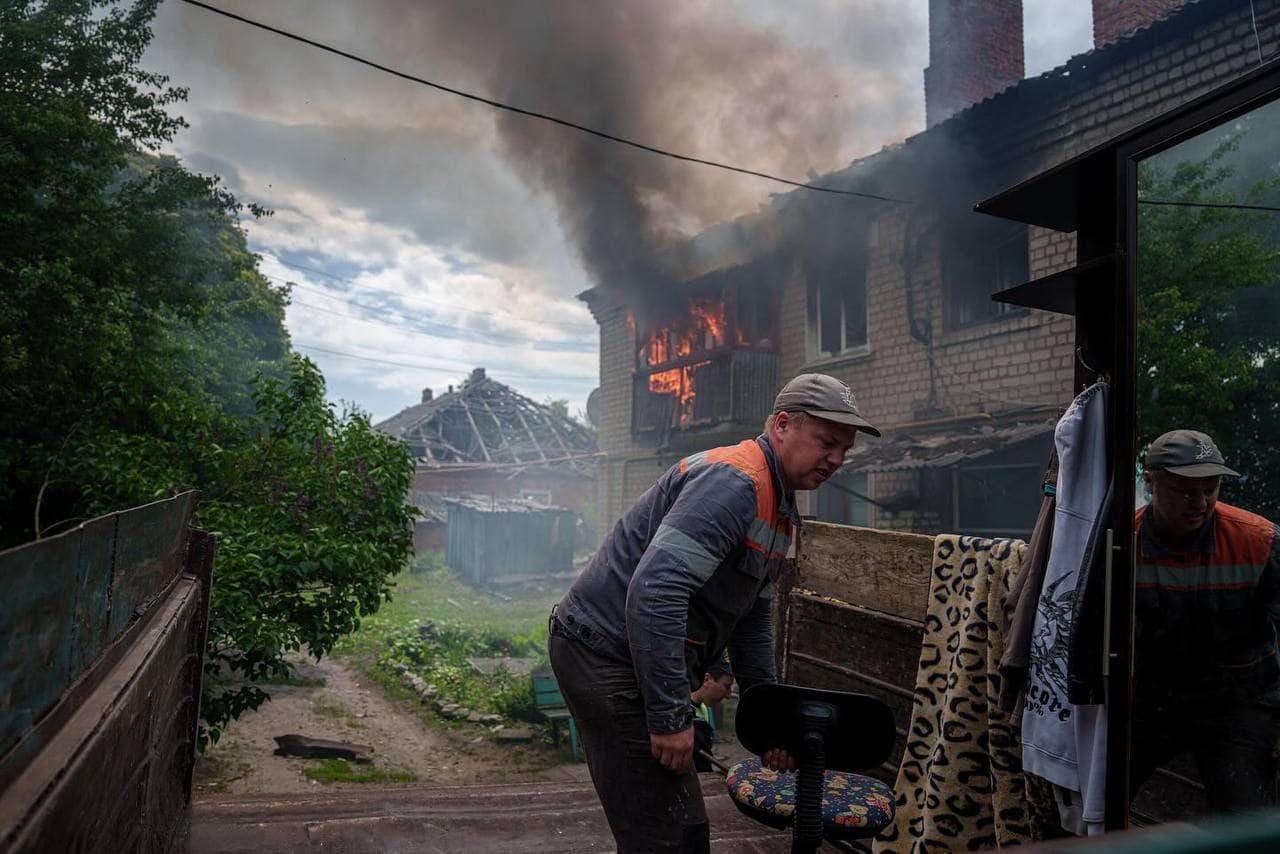


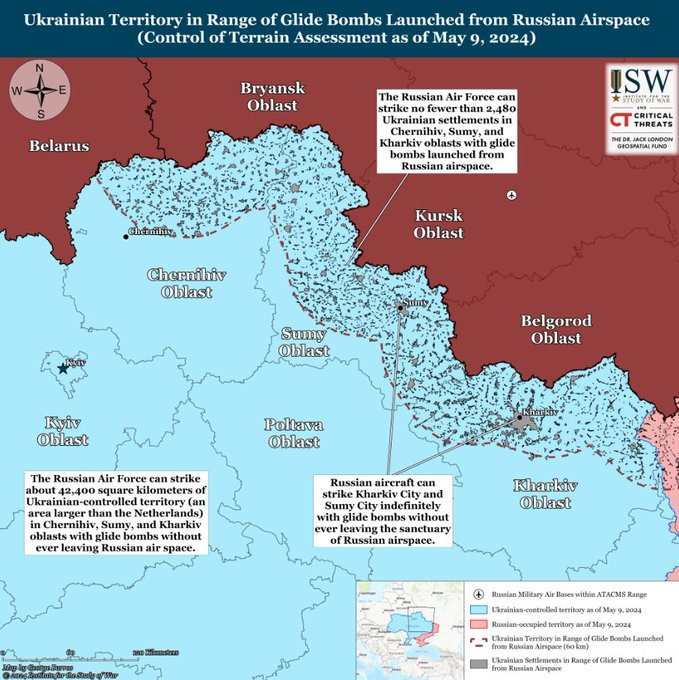
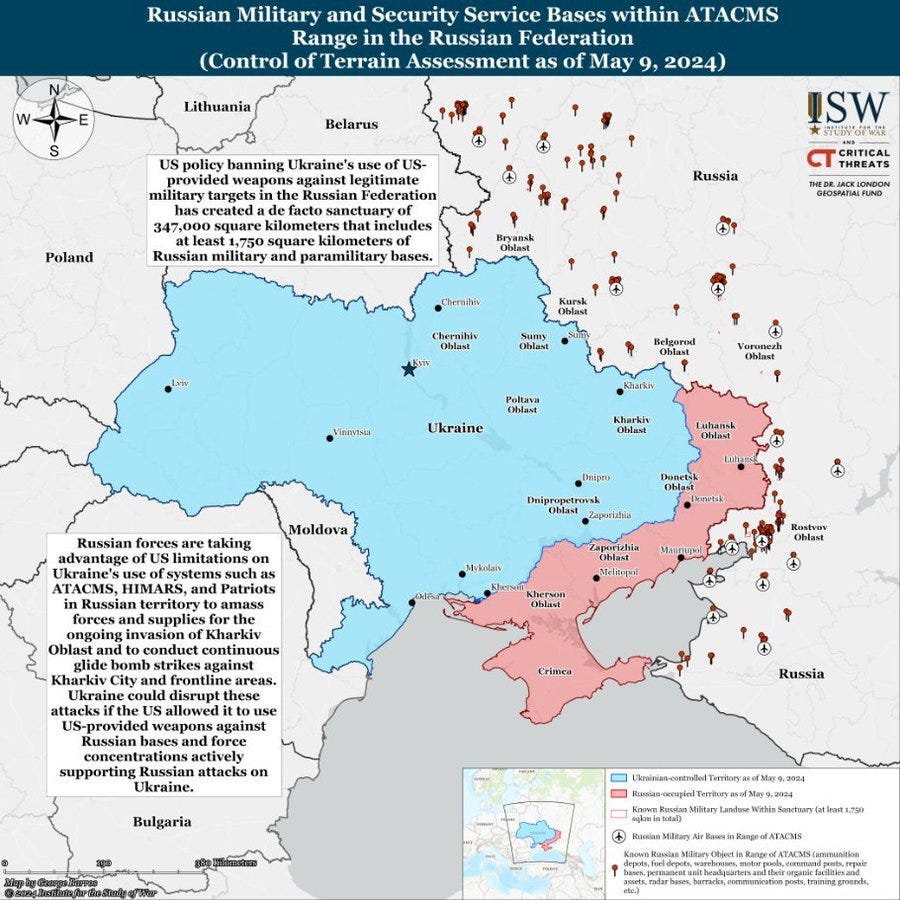

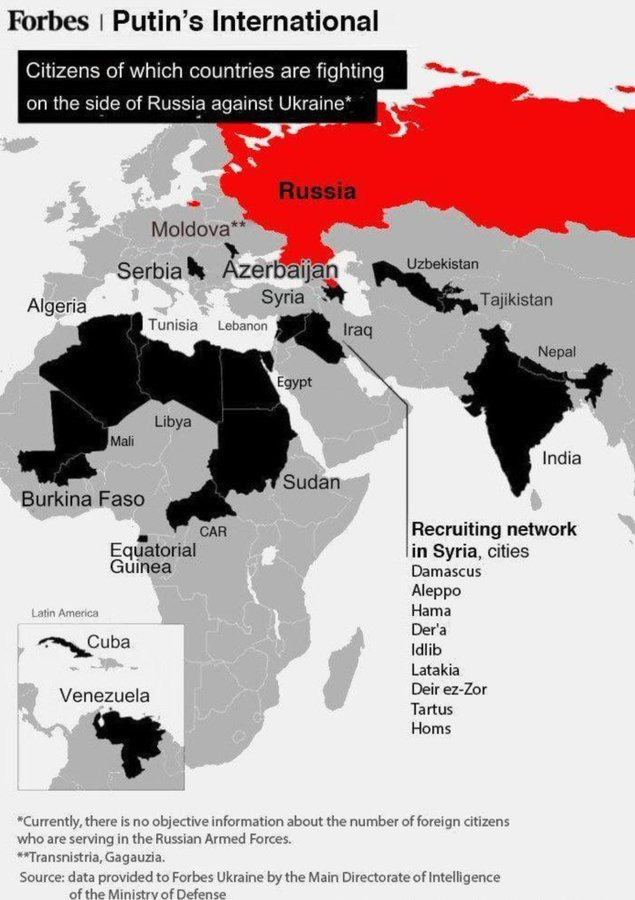

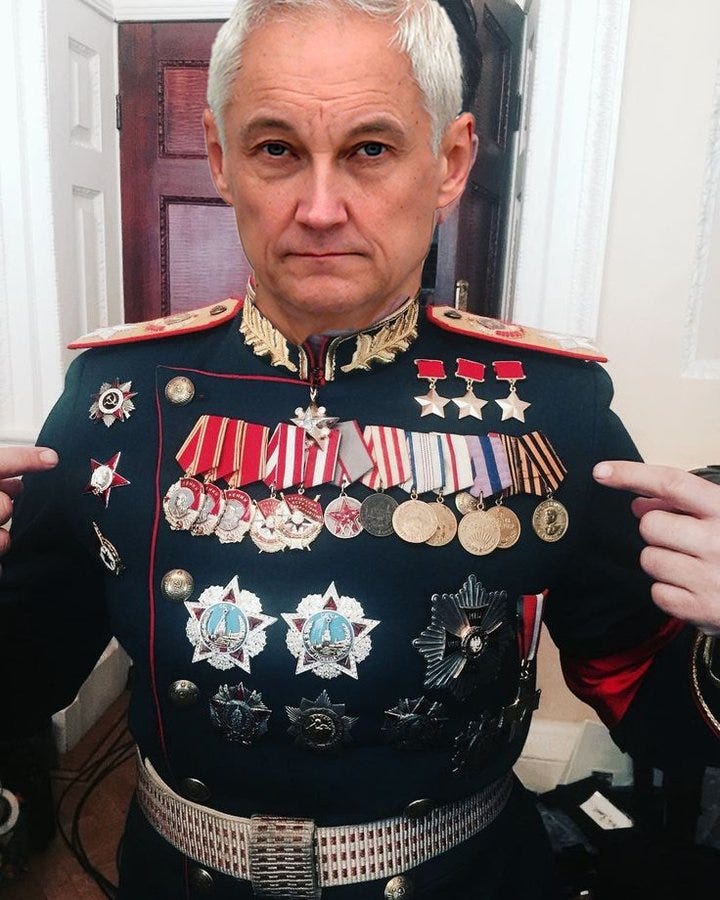








Kim Jong Un couldn't instill fear in anyone - he's a portly little man trying to play with the big boys and failing miserably. His actions constantly scream 'Look at me!' and it seems like he might even be a but annoyed that Russia and China are both garnering a lot of attention and he's been pushed down the priority list.
That photo of Belousov is hilarious!!!!
That Mali video is frightening . I feel like the US is completely on the back foot when it comes to Russian influence in the Sahel and other parts of Africa. As you pointed out earlier with the graph a lot of their recruits are coming from those areas. Wagner group didn't die - it's just been absorbed into a greater sphere of propaganda under the guise of helping these poorer countries. Russian influence is everywhere and spreading and I seriously cannot understand why it's not being taken more seriously!!
Olaf Schultz is no Angela Merkel and is struggling at home and internationally.
Thanks for the Vanuatu piece - this is not being covered in the major newspaper in Australia (Sydney Morning Herald) and the first I have heard about it. Interesting as China is usually front and centre.
Once again - seriously good coverage of the whole mess!! Thanks Monique!